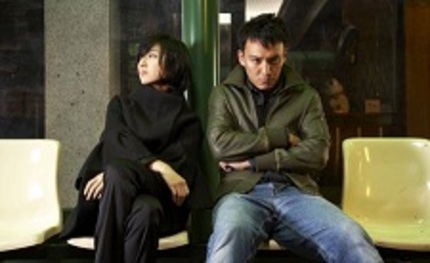PARKING review

Yes, parking. A man returns to his car to find he can't leave his parking space. It sounds the stuff of an arthouse disaster, yet first-time director Chung Mung-Hong draws this out into more than an hour and a half of Chang Chen wandering around Taipei in search of answers, managing to mine high drama, black humour, adventure and some captivating imagery out of the utterly mundane. Find out more about this cracking little film after the break.
Let's talk about symbolism for a moment. Obvious symbolism, at that. Characters who just can't stop trying to reach seemingly unattainable goals; props repeatedly turning up out of nowhere in the background of some otherwise unremarkable camera pan; implausible character traits and mannerisms with no real practical utility – handled poorly it can cripple any suspension of disbelief or sense of immersion the filmmakers have managed to establish. (When even [i]The Simpsons[/i] lampoons your attempts at subtlety, it's possible a little more thought could have gone into them.) Yet a large part of successful direction is arguably getting audiences to accept what on some level is blatantly obvious without asking awkward questions – take John Woo's Catholic upbringing mirrored in his heroes' protracted martyrdom and his famous doves, or Zhang Yimou's painting-by-numbers production design for [i]Hero[/i] or [i]Curse of the Golden Flower[/i].
Chung Mung-Hong's debut film [i]Parking[/i] tells the story of Chen Mo (Chang Chen – [i]Red Cliff, Blood Brothers[/i]), an ordinary citizen of Taipei struggling to balance the demands of his career and his young wife (Guey Lun-Mei – [i]Blue Gate Crossing, The Most Distant Course[/i]). On his way home for Mother's Day, Chen Mo decides to shop for cakes as a peace offering to his wife, but when he comes out of the store, he finds his car's been boxed in. [i]Parking[/i] proceeds to spin a string of strange encounters off this relatively mundane event, as Chen Mo wanders through the city searching for who exactly double-parked next to him. From an elderly couple mistaking him for their missing grandson, to a laconic barber (Jack Kao), a mob boss, his retinue and a hapless tailor (Chapman To), everyone Chen Mo meets is kicking their heels, trapped by circumstances, unable to move on – parking, if you will. The film even opens with Chen informing his wife he pulled a long stint at work the night before and, too tired to drive home, slept in his car.
Nonetheless, Chung directs with a wry, laid-back sense of fairly black humour, lending [i]Parking[/i] a self-awareness which goes a long way towards defusing any accusations of it being overly contrived. The script deftly interweaves comedy, pathos and though it's not especially violent, also manages some genuine peril. While not quite up to, say, Bong Joon-Ho or Tsui Hark circa [i]Peking Opera Blues[/i], it's a competent balancing act by any standards and proves almost queasily compelling. None of the cast qualify as heroes – they're all self-centred, venal, pathetic or run-down by turns – yet most are likeable, and it's something of a shock to see them put through the wringer.
The cast turn in some fine work; Jack Kao and Chapman To are solid in support and Guey Lun-Mei is excellent as Chen Mo's wife, giving credible dramatic weight to a part another actress or director might have marginalised. Chang Chen is stuck with having to internalise a great deal of his character arc, most of his choices or epiphanies remaining unspoken, yet thanks to his performance Chen Mo never feels like a stand-in for anything despite the story suggesting otherwise. Much of this proves down to Chang's obvious willingness to enter into every situation the director chooses to throw at him, from the intimidating to the surreal – perhaps not that surprising, given the number of genre roles on his resume ([i]Crouching Tiger, Silk, Red Cliff[/i]), and the success of his one comedy (the brilliant [i]A Chinese Odyssey 2002[/i]).
[i]Parking[/i] is also a surprisingly beautiful movie, doubly so when taking into account Chung Mung-Hong serves as the director, writer and cinematographer. Few filmmakers can juggle all three positions on their debut, let alone have it turn out this striking; Chung shoots Taipei with a blend of handheld cinema verite in a nod to the New Wave (Hou, Tsai and Edward Yang); slick, almost commercial artistry showcasing some picture-perfect framing, and a touch of seedy, voyeuristic gloss that foreshadows the surprisingly graphic sexual content in one story thread (recalling the lonely 'trysts' in Tsai Ming-Liang's [i]Vive L'Amour[/i]).
The main problem many could have with the film is it feels curiously unfinished. Though the various story threads dovetail into a fairly satisfying conclusion, it's something of a stretch to accept and leaves a number of questions unanswered. Chung manages to avoid backing into either a neat Hollywood resolution or an Inarritu-esque final act which continually reminds the audience of everything that brought them to this point, but he fails to avoid the nagging sensation this was more a convenient place to stop writing than a fitting coda.
It is a pleasing ending for all that, quietly optimistic and suggesting lessons [b]might[/b] have been learned, and the self-effacing tone overall stops this message from coming across as overly melodramatic or naïve. [i]Parking[/i] is far from perfect, a little too enigmatic for its own good, but it's an impressive debut, confidently directed and beautifully shot with an impressive cast who put in a great deal of effort all around. Though Taiwan's roster of youth-oriented queer cinema and whimsical, more upbeat arthouse fare can sometimes feel like something of a production line the country has put out several notable films by younger directors in recent years, but few suggest they could be the making of an auteur. By rights, [i]Parking[/i] should have all eyes on whatever Chung Mung-Hong decides to do next.






